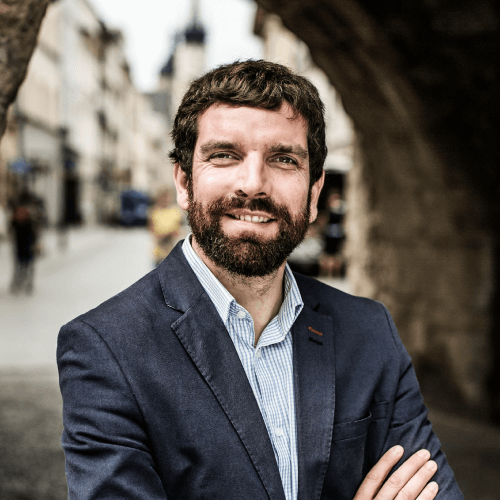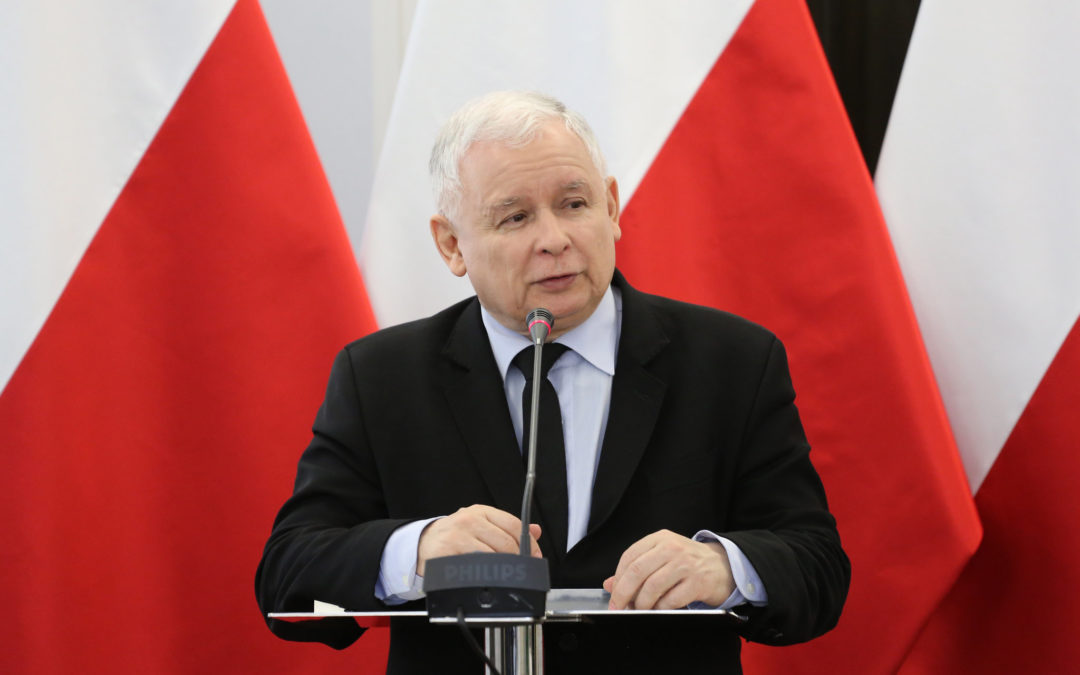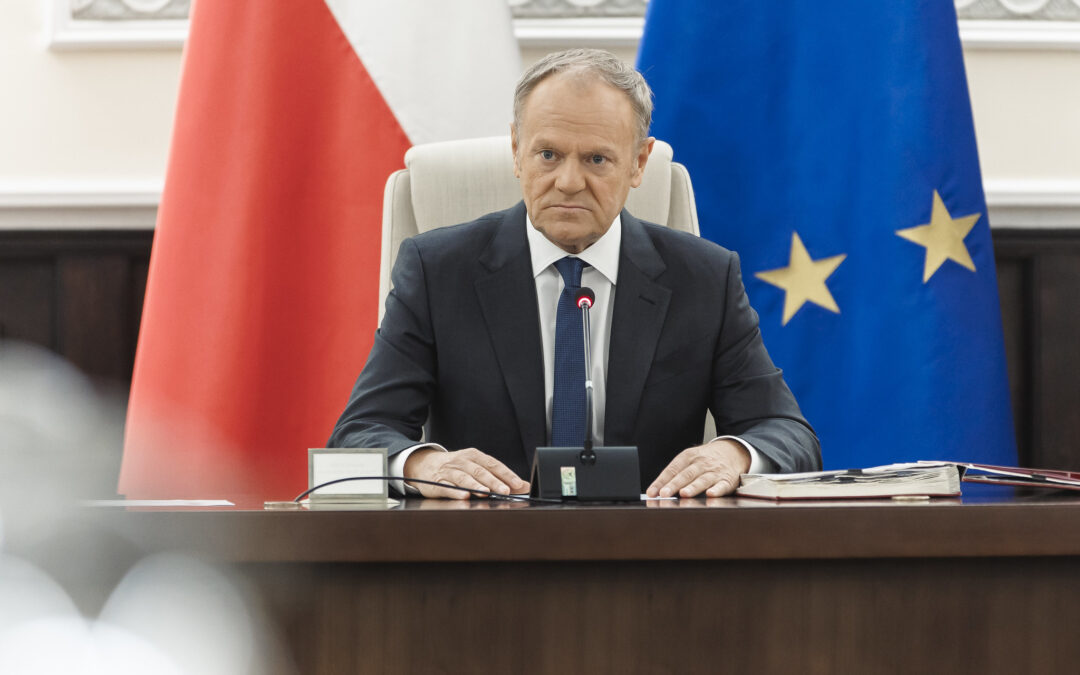By Stanley Bill
In the Polish parliament’s recent passing of three controversial judicial reform bills, it is easy to point to two interrelated motivations: (1) a naked power grab from the Law and Justice (PiS) party; and (2) an attempt to hobble institutions that have ruled against the party’s legislative proposals in the past and posed a threat to its key members. However, these potential motivations are less important than the background of a consistent ideological program propounded by PiS chairman Jarosław Kaczyński and his allies since 1989. The current legislative attack on judicial independence – including the anticipated dismissal of the entire Supreme Court – is part of a much broader plan for radical change. Kaczyński’s position has been unwavering: Poland’s state institutions need a revolution.
In a curious sense, Kaczyński is fundamentally a politician of principle, though – as recent events have confirmed – he is also prepared to bend or break the principles of the rule of law to achieve his aims. From Kaczyński’s point of view, the post-1989 Polish state is illegitimate, and therefore all means are justified in the establishment of a new order. Of course, this “new order” would also conveniently give absolute power to Kaczyński and his associates. Thus, one might argue that the means are precisely the end. Yet I would maintain that ideology is even more important than power. Throughout his political career, Kaczyński has repeatedly risked and even lost his grasp on power by pushing to deliver this ideological program. Understanding Kaczyński’s political convictions is the key to understanding the situation in Poland today.
The Polish state needs reform. Perhaps no Polish post-1989 government has shown as much energy in delivering change as the present one. From a certain perspective, their industry and commitment are laudable. But they will not succeed in renewing the Polish state in a lasting way on the present course of action. Above all, unconstitutional means are simply illegitimate – and this is the core of the current crisis – but the ideology itself is also flawed and self-defeating in its own terms. Jarosław Kaczyński’s diagnosis of the situation in the Polish state was arguably valid in the early 1990s, but today his uncompromising solutions are unlikely to create the new Poland of “his dreams.”
In theory
In his 2016 political autobiography, Kaczyński laid out his assessment of the earliest phase of the Polish post-1989 transition:
After the fall of communism, should we limit ourselves, firstly, to the return of democratic laws and civic freedoms along with the building of fundamental democratic institutions, such as the holding of elections; and secondly, to the reconstruction of fundamental economic categories, including money as the measure of value and the market with its institutions? Both of these operations have already been conducted in a very imperfect manner. Or is it also necessary to build a new state apparatus together with a new legitimisation, and, even more difficult, to create a new social hierarchy? One must strongly emphasise that these operations, which have basically been neglected, make those that have already been completed less real. For without them there is simply no chance of a properly functioning democracy and a properly functioning market.
In essence, Kaczyński defines the key dispute after 1989 as a disagreement over the depth of transformation required. The liberal wing of “Solidarity” – the inheritors of which include the current opposition Civic Platform party (PO) and media circles gathered around the Gazeta Wyborcza newspaper – were satisfied with the return of basic democratic freedoms, open elections, the rule of law, and a free market. They viewed attempts to discriminate against the representatives of the former communist power structure as unnecessary, impractical, and potentially dangerous. Kaczyński’s grouping – initially the Centre Agreement (PC) and later PiS – insisted that these positive changes would be inauthentic until a more radical reconstruction of political, social, legal and economic structures took place. This meant above all the counteraction of the privileged position that gave the former communist elites access to the new centers of political and economic power.
The second major pillar of Kaczyński’s diagnosis pertains to what he describes as a fundamental lack of political pluralism. In his view, the liberal wing of “Solidarity” attempted to join forces with the young and progressive members of the communist party to establish a new “monopower.” Their dream was supposedly to forge a new homogeneous “liberal” consensus, a power sharing arrangement in which there would be no place for traditional political divisions between a left, center, and right. According to this narrative, Kaczyński’s conservative grouping was the only force against this gathering “monopower,” and thus the only advocate of true democracy in Poland.
Over time, with the decline of actual former communists in the parliament, Kaczyński and his party shifted their arguments to suggest that their one-time “Solidarity” allies from the liberal wing were themselves the main representatives of the “post-communist” establishment. PiS’s contest with PO – a conflict between two primarily post-Solidarity parties – became a battle between the “real” Poland and the “post-communist” system, the representatives of “the people” and a corrupt elite. The tragedy of the Smoleńsk air catastrophe further radicalised this narrative.
In practice
Kaczyński’s interpretations in his autobiography are retrospective, though there is plenty of evidence to suggest that he held the same views in the early 1990s. Their presentation in a book published in 2016 makes their contemporary relevance crystal clear.
Kaczyński’s ambition today is precisely “to build a new state apparatus together with a new legitimisation and to create a new social hierarchy.”
The PiS leader’s preference has always been to change the constitution to create an entirely new state, the so-called “Fourth Polish Republic” in place of the degenerate and illegitimate Third Republic. In the absence of the required super-majority for constitutional change, he has adopted a different set of tactics, using all the legislative means at his disposal to build the “new state apparatus,” but also to create a “new social hierarchy.” These measures aim to dismantle the “monopower” of the alleged deal between the liberal wing of “Solidarity” and the former communists, destroying their dominant influence in politics, state institutions, the economy, the media and culture.
The rebuilding of the state apparatus is now in full swing. The war with the Constitutional Tribunal has already been a successful ad hoc measure to eliminate this check on the parliament’s legislative power. Now the new legislation to dismiss and reappoint the Supreme Court will continue this process. Judges are seen as an important part of the communist-liberal “monopower,” and thus as “anti-democratic” elements. To counteract their influence, significant authority has been concentrated in the hands of the Justice Minister Zbigniew Ziobro, who is also the Public Prosecutor General, and who will now have much greater power to discipline and control the courts.
The work of creating “a new social hierarchy” has been even more successful. PiS has effectively conducted purges in a whole range of areas, sometimes accompanied by the introduction of new legislation to simplify the process of installing preferred replacements. These mass personnel changes have especially affected the civil service, the public media, state-owned companies, and cultural institutions. In this case, PiS is largely repeating the noxious practice of previous post-1989 governments – including PO – though at a more rapid pace. The justification is that the representatives of the “monopower” had appropriated these institutions, illegitimately taking the position of social elite for themselves, while PiS is now simply restoring an elementary pluralism. Kaczyński’s book suggests the more radical goal of installing an entirely new elite.
A flawed ideology
Clearly all these measures are dubious – to say the least – in a liberal democracy. However, they are also based on false premises, potentially dangerous to Poland’s interests, and doomed to failure in the long run.
1. Jarosław Kaczyński’s diagnosis of Poland and its institutions is fundamentally anachronistic. In 1990, he may well have been right that the liberal “Solidarity” circles were too cautious and conciliatory in their approach to de-communisation and institutional change (of course, it is easy to say this in hindsight, while there were a great many uncertainties at the time). The result of this failure to intensify the pace of transformation was historical injustice: former regime members were able to appropriate state assets and maintain influence in the corridors of power.
But Poland is a very different country today. The main post-communist party (SLD) has been a spent political force for over a decade. Admittedly, some former communists still hold forms of economic power, but none of PiS’s policies can change this fact. Most state institutions – including the courts – are imperfect, but they are not communist bastions. Certain members of the Supreme Court have had mixed backgrounds in the communist era, but others have been members of Solidarity, and all judges have been subject to lustration procedures. Beyond the Supreme Court, most of Poland’s judges are too young to have been active before 1989.
Poland’s institutions need reform, but the “de-communising” argument for radical root-and-branch change is simply not justified by the current facts. Of course, corrupt individuals should be removed, and some opponents of the current law have conceded that the main judicial bodies have too much power, but none of this legitimises the nuclear option of removing judges en masse at the pleasure of the justice minister. It is difficult to escape the conclusion either that Kaczyński remains fixated on the failures of the 1990s or that the “post-communist” rhetoric is merely a justification for the accumulation of power – most likely, a mixture of the two.
2. Without social consensus and the required parliamentary super-majority to enact constitutional change, Kaczyński’s revolutionary plan to reconstruct the Polish state and Polish society is impossible. PiS won 38% of the vote with a turnout of only 51%. This is simply not a social mandate for the kind of radical change that Kaczyński wishes to implement. Accordingly, the “new legitimisation” of his ad hoc revolution is extremely weak. The only hope for lasting reform of the sort that Kaczyński desires is to find some way of reaching greater consensus.
The current conflict is not between the “sovereign people” and the “post-communist elite,” as PiS and the public media paint the picture. Politically, the dispute is between two former wings of Solidarity and their heirs. Socially, the dispute is between PiS’s electorate and a large sector of the society that does not identify with the government’s politics – for a variety of reasons – and generally supports a more positive interpretation of Poland’s post-1989 transformation. Many of these opponents of PiS also want reform of the judiciary, but they do not accept the undermining of judicial independence. Real reform will require broader consultation and difficult compromises.
3. Kaczyński’s ad hoc revolution is potentially dangerous for the future. Not only will it be invalid the moment PiS leaves power, but the damage inflicted on important democratic institutions may place tools in the hands of whoever follows the party in power. Kaczyński’s enemies or perhaps even new forces further to the right will benefit from his hobbling of the Constitutional Tribunal, further politicisation of state media and civil service, and taming of the courts. PiS and its supporters should consider whether the dismissal of the entire Supreme Court by an act of parliament is a precedent they would like to see repeated by future governments less congenial to their political preferences.
4. In practice, the smashing of the “monopower” and the recreation of a new social hierarchy has simply meant the installation of a new “monopower” composed of PiS loyalists. Government ministries, the civil service, public media, state-owned companies and cultural institutions have been stacked with new personnel appointed on the basis of political orientation rather than competence. PiS has carried this process further than the previous government within a shorter period of time. Replacing one political elite with another does not amount to de-politicisation or pluralising reform, and it certainly has nothing to do with the interests of the “people.”
5. With Brexit looming, a weakened EU and the uncertainties of a Trump administration, this is a poor time for Poland to be casting doubt on its democratic credentials and isolating itself from its allies. Even after Trump’s triumphant visit to Poland – a genuine success for the government – the US State Department has expressed its concern over the latest judicial reform bill. While Western media coverage of the Polish government has often been simplistic and ill-informed, the government’s real actions have been at the root of Poland’s plummeting reputation. As I have argued elsewhere, conflict with the EU and moves that contribute to the undermining of the international liberal order are fundamentally – and dangerously – contrary to Poland’s national interest.
Three decades too late
In 2017, Jarosław Kaczyński is delivering a program of radical reform that comes almost three decades too late. His methods will further enshrine negative precedents and legislation in Polish political life that may take decades to undo. His party and its supporters cannot – or refuse to – understand that a democratic mandate does not carry the right to unlimited action. The law and its guardian institutions place restrictions on all governments in liberal democracies. Without these restrictions, citizens are not safe from their state – and this will also apply to PiS and its supporters when the party is no longer in power.
In Poland, the institutions may well be imperfect. They may need major change. But they must be repaired within the restraints imposed by the law and by the separation of powers. Otherwise the remedy will be worse than the malady.
Main image credit: Flickr/SejmRP (Under CC BY 2.0)

Stanley Bill is the founder and editor-at-large of Notes from Poland. He is also Professor of Polish Studies and Director of the Polish Studies Programme at the University of Cambridge. He has spent more than ten years living in Poland, mostly based in Kraków and Bielsko-Biała.
He is the Chair of the Board of the Notes from Poland Foundation.




















